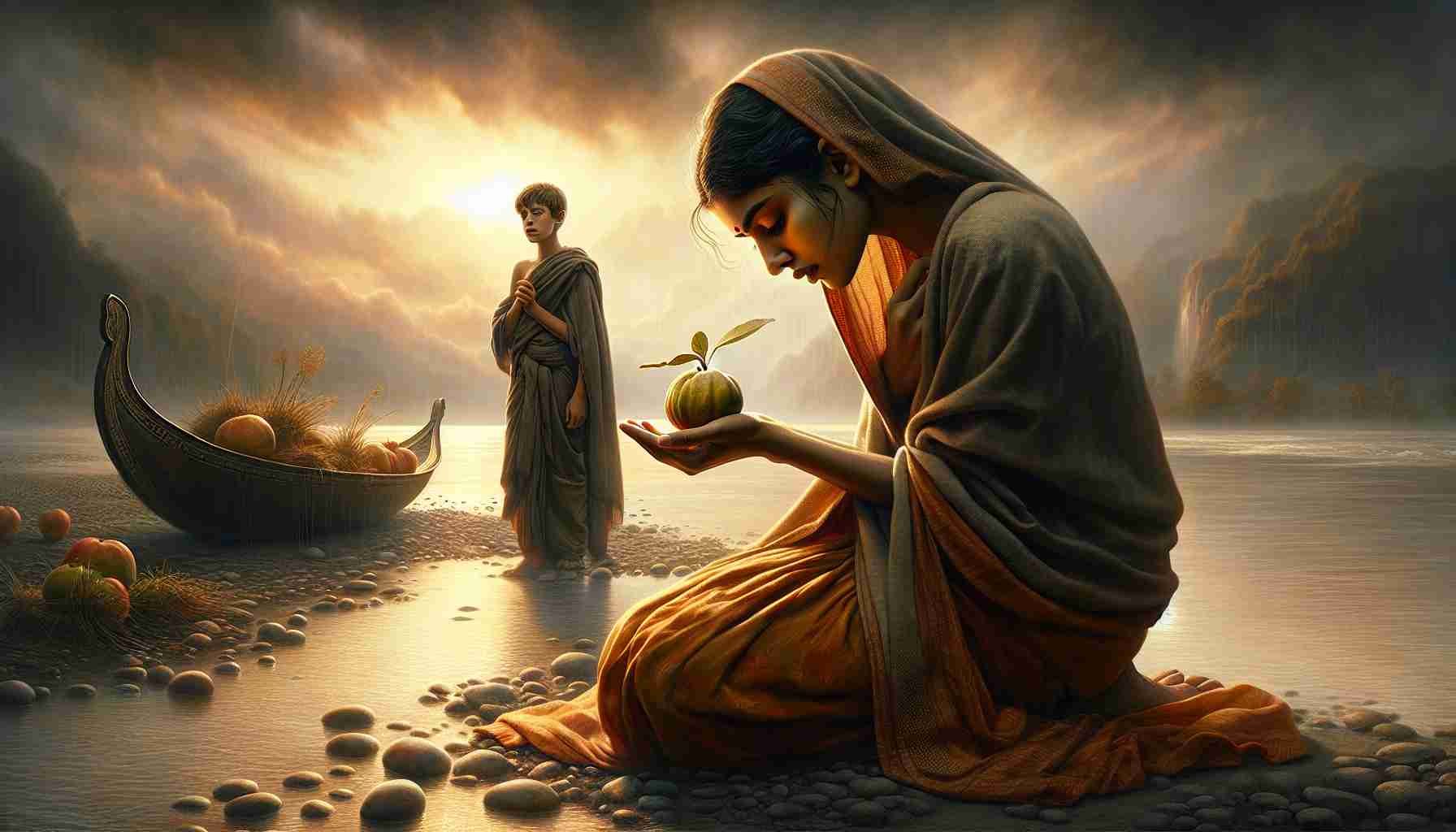

I was only twenty-five when my father’s body gave up before his spirit did.
My name is Gauri. The youngest daughter of a fruit vendor in Nashik, I inherited more than my father’s stall when he passed—I inherited responsibilities that bent my back more than any basket of mangoes ever had.
Each morning, before the heat fully bloomed across the sky, I would carry crates on my shoulders while repeating a mantra he’d once taught me—“Om Namah Shivaya,” the timeless prayer to Shiva, the god of transformation and grace. But by the time the sun set and the last banana was sold, I wasn’t whispering mantras. I was just tired. Bone-deep tired.
There were days I would sit behind the stall, watching the breeze stir the dust, and wonder if this was all life would be. Feeding three younger siblings, counting every rupee for rice and rent, and wondering if anyone truly heard my daily prayers or if I was just talking into an empty sky.
One monsoon morning, soaked and dragging a sack twice my size, I stumbled and skinned my knees on the stone path by the Ganga. I dropped the bag and sat there, muddy and wet, not caring who saw me cry. It wasn’t the pain—it was everything.
As I sat there, I remembered something from the Bhagavad Gita, when Lord Krishna tells the weary warrior Arjuna, “Abandon all varieties of duty and just surrender unto Me. I shall deliver you from all sin. Do not fear” (Gita 18.66). I had heard it so many times as a child, but at that moment, it felt directed at me—not poetic, but personal.
I whispered the verse through clenched teeth, still crying. “You told Arjuna not to fear. Then tell me now—what do I do?”
That’s when a boy—maybe seven years old—tiptoed through the puddle, holding a half-unripe guava. He offered it to me without a word. Just a guava. Wet and misshapen. But the silence in his eyes held no pity, only simple affection.
I took it.
I don’t remember the taste, only the warmth in my chest that slowly pushed away the weight pressing on it.
In the Upanishads, it says, “As rivers flow into the sea and lose their name and form, so the wise drop all desire and merge into the Divine” (Mundaka Upanishad 3.2.8). That moment felt like that. Like my burden, identity, exhaustion—they came apart. Even if just for a breath.
I still wake at dawn. I still carry too much. But something shifted. Now, before I lift each crate, I pause and exhale, whispering, “Not mine to carry alone.”
In the Ramayana, Hanuman once said humbly, “By Your grace alone, I cross the ocean.” That’s how I live now.
Burdened, yes.
But never alone.
I was only twenty-five when my father’s body gave up before his spirit did.
My name is Gauri. The youngest daughter of a fruit vendor in Nashik, I inherited more than my father’s stall when he passed—I inherited responsibilities that bent my back more than any basket of mangoes ever had.
Each morning, before the heat fully bloomed across the sky, I would carry crates on my shoulders while repeating a mantra he’d once taught me—“Om Namah Shivaya,” the timeless prayer to Shiva, the god of transformation and grace. But by the time the sun set and the last banana was sold, I wasn’t whispering mantras. I was just tired. Bone-deep tired.
There were days I would sit behind the stall, watching the breeze stir the dust, and wonder if this was all life would be. Feeding three younger siblings, counting every rupee for rice and rent, and wondering if anyone truly heard my daily prayers or if I was just talking into an empty sky.
One monsoon morning, soaked and dragging a sack twice my size, I stumbled and skinned my knees on the stone path by the Ganga. I dropped the bag and sat there, muddy and wet, not caring who saw me cry. It wasn’t the pain—it was everything.
As I sat there, I remembered something from the Bhagavad Gita, when Lord Krishna tells the weary warrior Arjuna, “Abandon all varieties of duty and just surrender unto Me. I shall deliver you from all sin. Do not fear” (Gita 18.66). I had heard it so many times as a child, but at that moment, it felt directed at me—not poetic, but personal.
I whispered the verse through clenched teeth, still crying. “You told Arjuna not to fear. Then tell me now—what do I do?”
That’s when a boy—maybe seven years old—tiptoed through the puddle, holding a half-unripe guava. He offered it to me without a word. Just a guava. Wet and misshapen. But the silence in his eyes held no pity, only simple affection.
I took it.
I don’t remember the taste, only the warmth in my chest that slowly pushed away the weight pressing on it.
In the Upanishads, it says, “As rivers flow into the sea and lose their name and form, so the wise drop all desire and merge into the Divine” (Mundaka Upanishad 3.2.8). That moment felt like that. Like my burden, identity, exhaustion—they came apart. Even if just for a breath.
I still wake at dawn. I still carry too much. But something shifted. Now, before I lift each crate, I pause and exhale, whispering, “Not mine to carry alone.”
In the Ramayana, Hanuman once said humbly, “By Your grace alone, I cross the ocean.” That’s how I live now.
Burdened, yes.
But never alone.